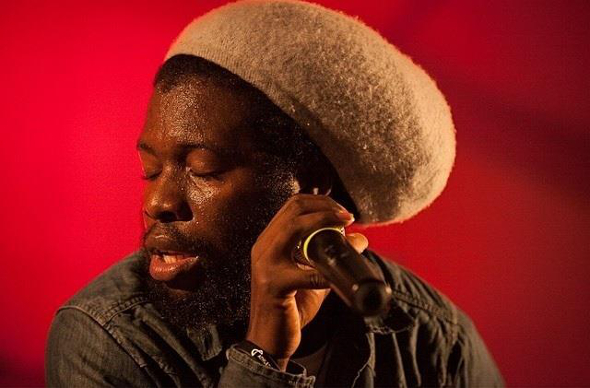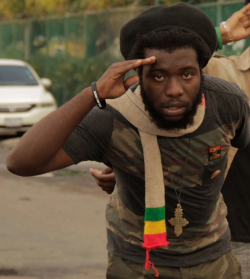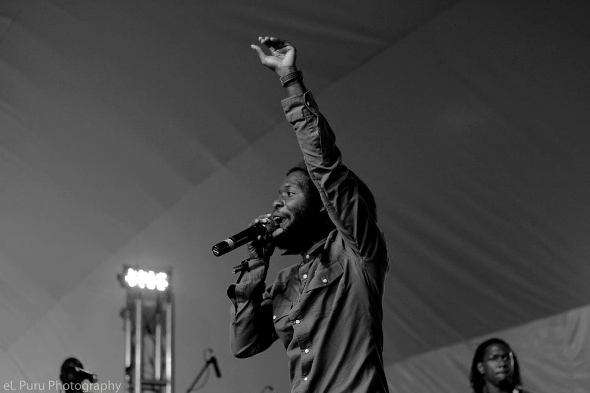Articles about reggae music, reviews, interviews, reports and more...
Interview: Iba Mahr
- Home
- Articles
- Interviews
- Interview: Iba Mahr

Interview: Iba Mahr
"Love is what I preach. It's a universal language"
Sampler
Iba Mahr is sat in the backstage area of Garance Festival 2014, eating potato chips. He is wearing diamond socks, and Wallabee Clarks – the fashion items detailed in his summer single, produced by Notis, Diamond Sox.
Over the four day event in Bagnols-sur-Cèze he will grace the main stage not once but thrice. Following his own set - backed by countrymen Dubtonic Kru - the young Jamaican, whose stuttering singjay delivery recalls a calmer, humbler Jacob Miller, is to be summoned as a surprise guest of both Alborosie and Anthony B. Not bad for an artist who has yet to release an album to the public.

“I’ve always heard about France and now I’m here to experience it for myself” he explains between crunches, when asked how it feels to be visiting a cockpit of European reggae for the first time, “I’m blown away”.
The salty snack he is eating might seem an incongruous accessory for a cultural reggae chanter. But to those conversant with the realities of touring life - where ital and vegan food can never be guaranteed - the chips are a necessary compromise for the Rastaman on the road.
Food figures strongly in the nomenclature of Iba Mahr’s upbringing. He was born Mario Greaves and grew up in the village of Cheesefield, St Catherine. Cheesefield is near to Linstead, whose market inspired the mento folk song where a typically longsuffering narrator tries to sell some ackee fruits and only manages a few pennies in return. Not that Iba Mahr over-plays the hardships of the locale.
“Linstead is full of joy. Have you ever heard about the best of both worlds? Well Linstead is very close to urban Kingston and it’s also close to rural like St Anne’s and Ocho Rios. You can get your food, your fruit, your vegetables, all of that thing but the town is very close by.”
Like many a country youth, Mario was raised by his grandparents. His grandfather, Vincent, had sound system named Majestic to which the future Iba Mahr remembers dancing to 70s classics such as John Holt’s cover of Tim Hardin’s If I Were A Carpenter. After high school Mario enrolled at U Tech to study computing and management – a decision that gave the budding songsmith grounding life skills.
 My career as a computer technician – music took that all away!
My career as a computer technician – music took that all away!
University was “Tremendous - because it’s more knowledge and overstanding of how to really function in different situations other than just in a musical position. On a daily basis we deal with different people of different professions, different styles, different walks of life. But in terms of my career as a computer technician – music took that all away!”
The original plan was to be a songwriter – not a singer. “We basically established our talent through writing songs. The intention was to write songs and find specific artists. I don’t want to name their names but just find the popular artists and give these songs to get some recognition “Yeah, it’s me that write that song deh”. But it never happened.”
“At the time we were writing songs my brethrens said “Iba, when you sing these songs you sound like you need to record too. You have a voice. You have a sound”.”
His first opportunity to record came through the veteran Max Romeo. “I linked him from a brethren called Cologne – who lived in the same community. We went there for three days and we never got a chance to record. Then on the third day we recorded, and interestingly the engineer at the time was the guitarist from Dubtonic Kru who I was just playing with on stage. He said “Max, Max, Iba have a sound”.” The result was the philosophical 2008 debut, Had It and Lost It on Romeo’s famous I Chase the Devil rhythm, the rookie’s distinctive timbre swamped in Autotune. “From that time we just got the opportunity to meet Fatis Burrell and more producers and artists like Jigsy King.” His second single, Where You Are, was for Burrell’s X-Terminator Records and found Iba still discovering his voice, sounding very like Lutan Fyah.
 Even if we are singing a love song we always reckon The King
Even if we are singing a love song we always reckon The King
Time spent in the legendary Fatis camp - which primed Sizzla and Luciano for global success - was not wasted. “Fatis is very inspirational - in some kind of weird ways too. He was always that kind of brethren who says “This is how it supposed to do and this is how it go and if you do it that kind of way you cy’an go wrong”. We always followed enough of those teachings too. But we learned to really record songs, make songs. That was where I learned how to really get the whole craft of making music.”
As a recording artist Mario took the name Iba Mahr - fusing two separate words. “Iba is humble and calm. It’s like name like nature. Mahr is an acronym – it means Mario of Harar” – referring to the eastern Ethiopian city. “Now as Rasta youth, when we started to sight up Rastafari we started to vision names. Names are important. Names should really represent one. We were seeking a name and Iba Mahr was the name.”
Dates are as important as names and places in Iba Mahr’s consciousness. The day before our interview was Haile Selassie’s birthday – did he commemorate it in any way?
“Every 23rd of July I find myself in a place where I just humble I self and vision different things for what we can do to uplift ourselves as a people, as a nation. Because we chant for repatriation and reparation. Basically that is what Rastafari stands for. We represent that. You hear it in our music. You see it in our dressing. You see it in how we move and even how we talk. Every song we sing we try to sing about Haile Selassie I. Even if we are singing a love song we always reckon The King.”
 The door to Rastafari opened via a realizing the importance of proper diet. “My consciousness really came through how we used to sit around a whole heap of Rastaman and every day we would cook food and it was all about eating Ital and eating vegan food. No meat, no fish, no flesh, no milk, no cheese. Through that I sighted up a whole heap of understanding of myself and my temple. That is where the consciousness starts to get in. Then came Rastafari.”
The door to Rastafari opened via a realizing the importance of proper diet. “My consciousness really came through how we used to sit around a whole heap of Rastaman and every day we would cook food and it was all about eating Ital and eating vegan food. No meat, no fish, no flesh, no milk, no cheese. Through that I sighted up a whole heap of understanding of myself and my temple. That is where the consciousness starts to get in. Then came Rastafari.”
But how easy is it to obtain the right food when you’re travelling in Europe? He smiles resignedly and gestures to his chips “It’s never right. Because even if you get the vegetables and fruits it’s just not like from the tropics!”
Being knowledgeable with computers the early efforts he voiced were digital. “But it never had that roots vibes. At that time we started out doing more computer technique. Now we are doing more live music. Max Romeo always said “You only need one song. Do good music. Don’t just do music”.”
Since then Iba has recorded several singles that could be classed as good roots music. These include Will I Wait In Vain, Sound A Alarm and Babylon Debating (all produced by his main rhythm maker Roland McDermott). Most were laid at Bob Marley’s Tuff Gong studio where Iba Mahr has a good link for session time.
“Yeah, very interesting man. So many songs are really an energy that’s connected with Tuff Gong. I’m not sure if Bob Marley spirit is there but…” he breaks off into a laugh.
2011’s Will I Wait In Vain was Iba’s breakout hit and was featured on VP Records’ Reggae Gold compilation series the following year. It’s a lovers’ lament which showcases that now familiar stuttering cadence. His vocal style is difficult to categorise into deejay, singer or singjay, and he doesn’t try (“I think I should leave it to the people. There are too many different arts, different crafts and different styles”).
 I think the greatest struggle is yet to come
I think the greatest struggle is yet to come
A less known quality to Will I Wait was the speed of its execution - indicating that as a writer Iba Mahr doesn’t hang around. “Basically Roland sent me the email with the rhythm and on the same day I wrote the song. I went to the studio same day, put the headphones on and once “record” was on I was just singing and singing like an analogue recording – trust me. We mixed the song the same time and it was playing on the radio the next morning.”
Hard roots tune Babylon Debating was also distributed by VP. A scathing rebuke to the system as a whole, it actually had its genesis in local issues.
“Remember I told you about Linstead having rural and urban? On the more rural side you have taxis that drive to and from the community to the town. In England you have all those nice roads but in Jamaica we have bad roads with what we call potholes. So that’s basically the inspiration – “No bother talk about taxi man because no road no deyah fi drive taxi ‘pon”. We listen to the news and the debates of government and the system and what they talk about. Yet they are still not solving some of the problems, the important things are still being left.”
The conversation turns to 80s style dancehall track Diamond Sox built by Unga Barunga and Jason Welsh, the drum and bass duo Notis. Since the summer it has spawned a remix with Tarrus Riley. United Reggae notices that in addition to the aforementioned argyle golfing socks and Wallabee Clarks shoes he is even wearing a Diamond Sox T-shirt.
“That’s because you are a British man.” Iba laughs “Diamond socks and Clarks have a long history with Jamaica – some people say it is a rude boy thing and some people say it is a Rastaman thing! But because of the connection between England and Jamaica from way back before 1962 we would get a whole heap of the English products. England things would always come over to Jamaica. Our style really connects with England.”
According to Al Fingers’ 2012 book Clarks in Jamaica, the Clarks Desert Boot was based on a design soldiers requested in Egypt – so in a way Clarks come from Africa?
“Exactly! See the connection there! Clarks are well made shoes too. I don’t know if this is a free promotion or something! Clarks is nice. I love Wallabee Clarks, Desert Clarks – if it fit me and look good – still.”
Diamond Sox is another tune that was written and knocked out in a hurry.
“Very nice song. Give thanks to Notis – Unga and Welsh. Those youth have been there through everything we do. Even if it’s not their own production they are there to help us.”
“The song came about in a very weird way. I was in the studio and they said “Alright, we are go play a riddim. Iba this is not your riddim still but if you like it you like it.” And it was a similar thing to Will I Wait – I just started recording “In a mi diamond sox and mi Wallabee Clarks” and – hit!”

This seems a good moment to press the obvious question. Given the speed at which he writes, why is no album out yet?
“Ah. I hear that so much. It’s Iba Mahr time and I’m still not feeling the timing. I think I need the perfect timing and the perfect stage to really set that album. It’s more than just putting out the album because I have been here for a while. It’s more like putting out at the right time. Is it anticipated?”
I think so.
“Well that’s a good thing.”
Will the album feature the work of one producer or many? As well as Notis and Roland, he’s done some strong collabs with Winta James of Ovastand Entertainment.
“We’ll share the joy. Definitely share the joy. Because we do songs with so many producers. So many nice songs with different producers, so we have to sit down and reason that out.”
Later in the evening Iba will join Alborosie on stage. Is Jamaica still a dancehall country, as Albo told United Reggae in 2013 - when we asked about the new crop of Jamaican roots artists like Iba Mahr and Chronixx?
“Yeah man. But you have to remember Jamaica is very creative – we create things. We have dancehall, we have reggae, you still have youths who do hip hop because hip hop has a connection with dancehall and we have some youths who do rock reggae too.”
“But dancehall is still a strong part of our culture and it is alive same way. We have a balance in terms of how people appreciate reggae music and dancehall music. Dancehall music still has its fans. Reggae music still has its fans. But in Jamaica, to me personally, the same people who love dancehall somewhat love reggae and the same people who love reggae somewhat love dancehall. Like for example at a Sting event, a whole heap of people who come out to see a dancehall artist, I think the vast majority of that audience go to Rebel Salute also! Musically they are the same thing. It’s just like appetite. It’s what you want at the time. Sometimes people really want to hear conscious music to bring them to some sort of level – sometimes they just want to dance!”
 We have the album coming very, very soon
We have the album coming very, very soon
It’s time to finish up the interview. What has been greatest struggle in his career?
“I think the greatest struggle is yet to come. Thus far I think music and the industry has been so good to me that there is very little I can complain about. Probably just taking the plane so often and having to meet these obligations of being on the stage is really a challenge. A humble youth who is not used to travelling gets the opportunity to travel all over the world and I have to meet these obligations of reaching on time to different events. I have to leave this show and go to a next festival somewhere in Spain, somewhere in France, so it is sometimes hassling but we do it. In Jamaica starting out in music for most artists it is somewhat of a struggle to really get your music played and your voice heard on the proper radio stations. But once it is connected with the people then there is very little you have to worry about. I think the college of the music is Jamaica and once they say, then you are ready to go. That is a struggle we should all go through.”
 Max Romeo always said "Do good music. Don't just do music"
Max Romeo always said "Do good music. Don't just do music"
And what is the single driving message of his songs?
He chews this over while having some chips. “Love. Love in every song. If you take the time out to look at an Iba Mahr [song] list you’d see Will I Wait In Vain For Your Love, Love Thy Neighbour, Love You Girl” – the latter is the latest single for the Autumn. “It’s always something about love. Love is what I preach. It’s a universal language.”
What’s coming next for you?
“Well next week we are going Reggae On The River in California.” Suddenly he stops - seeing this question for the fishing expedition it is. “But what are you anticipating - the album?”
Yes, we were hoping to hear more about the album, we confess.
“We’ll soon have a date. We’ll soon have a date. We have the album coming very, very soon. Definitely this year.”
Comments actually desactivated due to too much spams
Browse by categories
Recommended Articles
Latest articles
Recently addedView all
© 2007-2026 United Reggae. All Rights Reserved. Reproduction in whole or in part is prohibited. Read about copyright
Terms of use | About us | Contact us | Authors | Newsletter | A-Z














